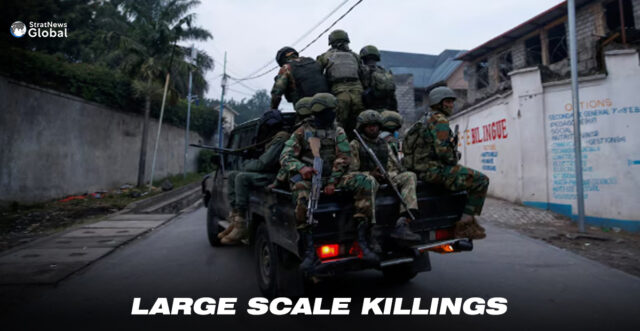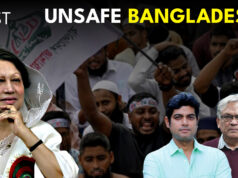An M23 rebel assault on farmers and other civilians in eastern Democratic Republic of Congo killed 169 people earlier this month, a UN body said, marking one of the deadliest incidents since the Rwanda-backed group’s resurgence.
M23 leader Bertrand Bisimwa told Reuters it would investigate, but the report could be a “smear campaign”.
The UN rights body’s account has not been previously reported and emerged as U.S. President Donald Trump’s administration pushes for peace between Congo and Rwanda, which it hopes will unlock billions in mineral investments.
Reuters has not been able to independently confirm the killings, but a local activist cited witnesses as describing M23 combatants using guns and machetes to kill scores of civilians.
The M23 and Congolese government have pledged to work towards peace by August 18 after the rebels this year seized more territory than ever before in fighting that has killed thousands and displaced hundreds of thousands more.
Killings Started On July 9
According to findings by the U.N. Joint Human Rights Office (UNJHRO), which monitors Congo, the M23 operation that led to the farmers’ killings began on July 9 in the Rutshuru territory of North Kivu province.
It targeted suspected members of the Democratic Forces for the Liberation of Rwanda (FDLR), a Congo-based group that includes remnants of Rwanda’s former army and militias that carried out the 1994 Rwandan genocide, UNJHRO said.
“Civilians, mainly farmers temporarily camping in their fields for the ploughing season, have been attacked. The human toll has been particularly high: at least 169 people have been killed,” UNJHRO said in findings shared by Reuters.
The victims were “far from any immediate support or protection,” UNJHRO said, citing credible information from several independent sources.
In response, M23’s Bisimwa said the group had been notified about UNJHRO’s findings in a letter and would form a commission to investigate the unconfirmed accusations.
“We believe that before imposing sanctions, the facts must first be established by verifying their actual existence through an investigation,” he said.
“This rush to publish unverified information is propaganda whose purpose is known only to the United Nations Joint Human Rights Office,” he said, adding that the allegations could be part of a “smear campaign” by Congolese employees of UNJHRO.
UNJHRO is made up of the human rights division of Congo’s U.N. peacekeeping mission and the former office of the UN High Commissioner for Human Rights in Congo.
It has both Congolese and foreign staff members.
Hutu Farmers Targeted
The activist in Rutshuru, who did not want to be named for safety reasons, told Reuters the M23 combatants killed more than 100 civilians, mostly Congolese Hutu farmers.
The victims had initially fled when M23 advanced on the territory, but they returned after M23 promised them safety, the activist said.
U.N. human rights chief Volker Turk said last month that M23, Congo’s army and allied militias had all committed abuses in eastern Congo, many of which may amount to war crimes.
Rwanda has long denied helping M23 and says its forces act in self-defence against Congo’s army and ethnic Hutu militiamen linked to the 1994 Rwandan genocide, including the FDLR.
A report by a group of United Nations experts published this month said Rwanda exercised command and control over M23 and was backing the group in order to conquer territory in eastern Congo.
A government spokesperson said at the time that the report misrepresented Rwanda’s security worries related to the FDLR and affiliated groups. The spokesperson, Yolande Makolo, did not respond to a request for comment about UNJHRO’s findings.
Persistent violence in eastern Congo threatens Trump’s vision for the region, which has been plagued by war for decades and is rich in minerals including gold, cobalt, coltan, tungsten and tin.
Peace Deal
A peace agreement signed on June 27 in Washington by the Congolese and Rwandan foreign ministers requires Congo to “neutralise” the FDLR as Rwanda withdraws from Congolese territory.
Both the Congolese operations against the FDLR and the Rwandan withdrawal were supposed to have started on Sunday, though it is unclear what progress has been made.
They have three months to conclude.
Congolese government spokesperson Patrick Muyaya told Reuters the killings in Rutshuru demonstrate that M23 is a destabilising force incapable of bringing security.
Kinshasa wants a peace deal that will allow for the restoration of its authority in the region, Muyaya said.
(With inputs from Reuters)





